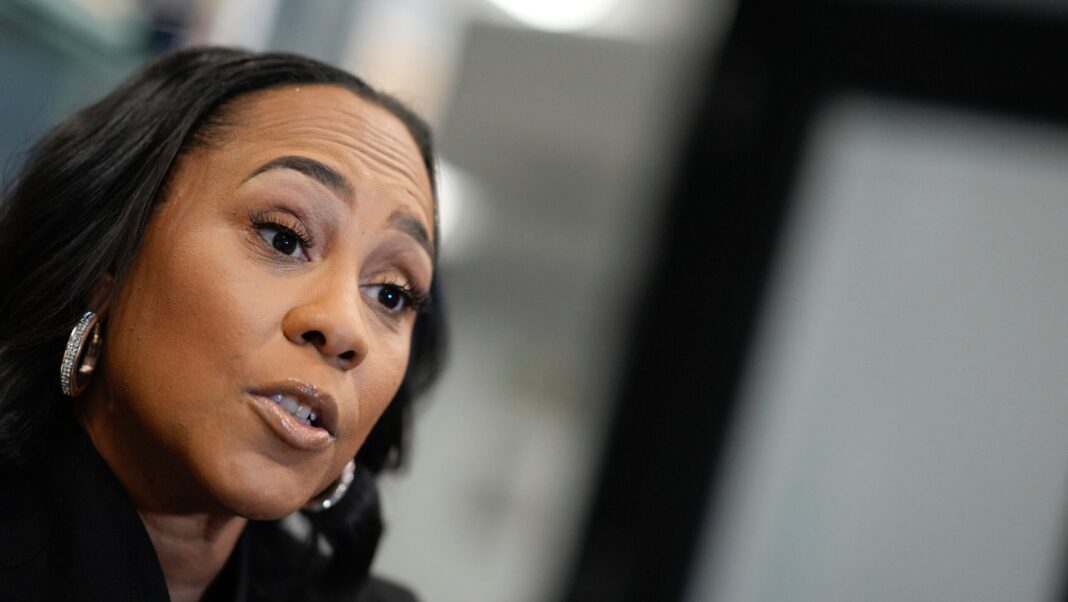Georgia Supreme Court Denies Fani Willis’ Appeal in Trump Case
In a notable development in the ongoing legal saga involving former President Donald Trump, Georgia’s highest court has chosen to decline an appeal from Fulton County District Attorney Fani Willis regarding her removal from the case concerning alleged election interference. This decision stems from a ruling that highlighted an “appearance of impropriety” linked to Willis’s romantic relationship with Nathan Wade, a special prosecutor she appointed to lead the investigation.
Background of the Case
In December, the Georgia Court of Appeals determined that Willis and her office could no longer prosecute the case against Trump and several others. The ruling was a significant blow to Willis, who had been at the forefront of the investigation into attempts to overturn Trump’s narrow 2020 election loss in Georgia. Critics of Willis suggest that her personal relationship with Wade tainted the integrity of the prosecution and justified her disqualification from the case.
Reaction to the Court’s Decision
Following the appeals court’s ruling, Trump’s attorney, Steve Sadow, expressed strong support for the decision, emphasizing that Willis’s actions warranted her removal. “Willis’ misconduct during the investigation and prosecution of President Trump was egregious and she deserved nothing less than disqualification,” Sadow asserted in his statement. This perspective reflects the intense scrutiny surrounding both the case and the individuals involved.
Willis, on her part, expressed her disagreement with the ruling. However, she committed to ensuring that the case file and evidence would be made available to the Prosecuting Attorneys’ Council of Georgia to facilitate the appointment of a new prosecutor.
Future of the Case
With the Georgia Supreme Court’s refusal to hear Willis’ appeal settled in a close 4-3 decision, the responsibility now shifts to the Prosecuting Attorneys’ Council to find a successor. This new prosecutor will have the discretion to either continue with the existing strategy laid out by Willis, pursue specific charges, or potentially dismiss the case entirely. Finding someone willing and equipped to take on a case of such complexity could prove challenging.
Should the new prosecutor decide to proceed with the case, they would still have to navigate the legal landscape that now includes the fact that Trump is a sitting president, potentially complicating any efforts to prosecute him. Nonetheless, 14 other defendants still face serious charges stemming from the grand jury indictment issued in August 2023.
Allegations Against Trump
The indictment against Trump and 18 others centers on the use of Georgia’s anti-racketeering statute, alleging a coordinated effort to illegally overturn the results of the 2020 presidential election in the state. Central to the accusations is Trump’s infamous phone call to Georgia Secretary of State Brad Raffensperger, in which he urged the official to “find” enough votes to overturn his loss to Joe Biden.
In conjunction with this case, four individuals have already pleaded guilty as part of the broader investigation.
Broader Context of Trump’s Legal Troubles
The Georgia case is just one of several legal challenges facing Trump in 2023. Alongside this matter, he has found himself entangled in different criminal prosecutions, including enjoying an unexpected legal win in his hush money case in New York, where he was convicted but ultimately received no punishment.
Legal Arguments and Implications
Willis’ appeal to the Georgia Supreme Court raised important legal questions about the standards for disqualifying a district attorney. She argued that her removal was unprecedented, claiming that no court in Georgia had previously disqualified a prosecutor based solely on the appearance of impropriety without tangible evidence of a conflict of interest or misconduct.
Trump’s legal team contended that the lower court’s ruling was justified, asserting that her disqualification was necessary to eliminate any “taint of impropriety” from the proceedings. This disagreement underscores the complexities and nuances of legal ethics in high-stakes cases involving public figures.
A Watchful Eye on the Proceedings
As the situation unfolds, the attention of legal scholars, political commentators, and the public remains fixated on the implications of this case. The appointment of a new prosecutor and the decisions they make will undoubtedly shape the narrative surrounding not only the integrity of the legal system in Georgia but also the future of electoral accountability in the U.S.



